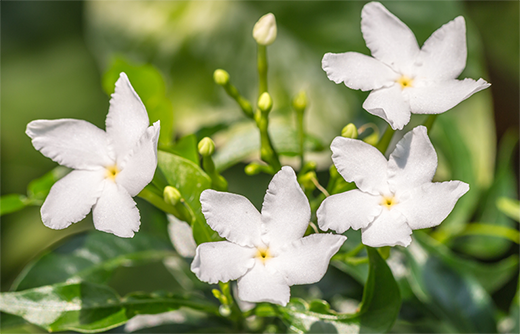
The Jasmine plants may be vines or bushes and some are evergreen. It contains around 200 species native to tropical and warm temperate regions of Eurasia, Africa, and Oceania. The name of the plant ‘Jasmine’ or Jasminum, comes from the Persian word “Yasmin” meaning “Gift from God.” Jasmine is believed to have originated in the Himalayas of western China, a country where this delicate, fragrant flower is known as the “Queen of the Flowers”.
It is mainly the flowers that have been used for time immemorial for their healing and uplifting properties. Jasmine essential oil has been used in many parts of Asia as a natural remedy for depression, anxiety, stress and insomnia for thousands of years.
Jasmine is a source of exotic fragrance in the warmer seasons and an important scent noted in perfumes and has herbal properties. The flower is used to make medicine.
The delicate aromatic tea made from Jasmine flowers became hugely popular in the Ming Dynasty (1368 – 1644 AD), with the most famous and traditionally scented Jasmine tea coming out of the Fujian region. The tea was drunk not only for its wonderful taste, but also for the many benefits to overall health and wellbeing it imparted.
JASMINUM OFFICINALE
The flowering shrub Jasmine, Jasminum officinale in Latin, has several alternative names, like Common Jasmine, Poet's Jasmine and White Jasmine.
It has been used for:
- liver disease (hepatitis)
- pain due to liver scarring (cirrhosis)
- abdominal pain due to severe diarrhea (dysentery)
- to prevent stroke
- to cause relaxation (as a sedative)
- to heighten sexual desire (as an aphrodisiac)
- in cancer treatment
White Jasmine Tea
The tea made of White Jasmine is an incredibly healthy tea. It’s packed with antioxidants and has been linked to many impressive health benefits. It is high in polyphenols that act as antioxidants in the body. It also contains the powerful polyphenol EGCG, which is linked to many health benefits like reduced heart disease risk.
Drinking White Jasmine tea may:
- lower your risk of heart disease, mental decline, and certain cancers
- help neutralize plaque-forming bacteria like Streptococcus mutants
- combat bad breath
- protect against heart disease by preventing LDL (bad) cholesterol from oxidizing
- protect against clogging your arteries
- help you lose weight
- improve oral health
- boost brain function
- boost your metabolism
Best of all, White Jasmine tea is delicious, has a sweet, subtle, and refreshing taste. It is easy to prepare and to add to your diet. Try adding the tea to your diet to reap its impressive health benefits.
Good to know
- White Jasmine if inhaled improves mood, reduces stress, and reduces food cravings.
- In foods, jasmine is used to flavour beverages, frozen dairy desserts, candy, baked goods, gelatines, and puddings.
- In manufacturing, White Jasmine is used to add fragrance to creams, lotions, and perfumes.
Health Benefits of White Jasmine tea
- contains caffeine and L-theanine, which may help keep you more alert and vigilant
- also may improve short-term memory
- lowers risk of Alzheimer’s and Parkinson’s disease
- helps your body use insulin more effectively
- reduces blood sugar levels; this may help lower your risk of type 2 diabetes
- Animal, test-tube, and human research show that jasmine tea polyphenols may help suppress the growth and spread of cancer cells
- is used on the skin to reduce the amount of breast milk
- is used for skin diseases
- speeds up wound healing
